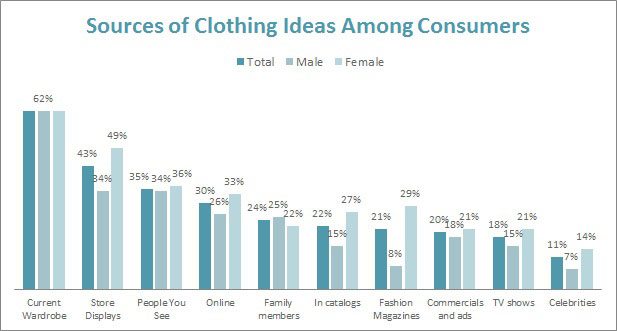The movie and music awards season may be over, but interest in celebrities never wanes. From movie premieres, to summer concerts to the always-fun dating and dumping scene, Americans love to follow their favorite singers, actors, athletes and reality stars. And the question of “Who are you wearing?” remains popular both on the red carpet and off.
[quote]”From magazine covers to ad campaigns, a celebrity’s image can be used to provide an attainable passport to a glamorized lifestyle,” says Qianna Smith, senior editor on the Nordstrom.com blogs. “Celebrities are influential brand ambassadors because it is easy to relate or become attracted to the characters and media personalities they portray.”
Of course, most consumers do not want to admit that Kimye (Kim Kardashian and Kanye West) could have an effect on what they actually purchase. More than six out of 10 consumers (63%) say they get apparel ideas from what they already own and like, followed by store displays or window shopping (43%), people they see regularly (35%), and the Internet (30%), according to the Cotton Incorporated Lifestyle Monitor™ Survey.
Further down the list, consumers tell the Monitor they are influenced by family members (23%), catalogs (22%), magazines (21%), commercials and ads (20%), TV shows (18%) celebrities (11%) and in-store salespeople (6%).
Celebrities are undeterred by this relative cold-shoulder. This spring, Matthew McConaughey is introducing JKL men’s wear. Kate Hudson will design a capsule collection for Ann Taylor. Singer/rapper and “American Idol” co-host Nicki Minaj has an apparel line coming to K-Mart stores. And “The Voice” co-host Adam Levine of Maroon 5 has a new line with Shop Your Way.
Brands, celebs and advertisers believe consumers simply do not want to admit the strength of media and star power. But, Americans spend 35 hours per week watching video across screens, according to the latest Nielsen Cross-Platform Report. They spend another five hours per week browsing the Internet on a computer.
“Every year, consumers deny [they made purchases influenced by celebrities],” the NPD Group’s Marshal Cohen told the Today Show’s Life Inc.com. “Yet the numbers show they do it more and more. ” Cohen says 10 years ago, 8% of survey respondents said they made purchases as a direct result of celebrity influence. But in a March 2012 survey, 18% say they did so. “They don’t like to admit they are easily influenced and swayed.”
Montgomery Frazier, image consultant and lifestyle correspondent to Billboard magazine, says stars still wield an “enormous” amount of influence over what the masses wear.
“It all comes down to who the celebrity is and what they represent,” he maintains. “I think the public is still enchanted with ‘celebrity’ because it appears to be an aspirational lifestyle that epitomizes the American dream — until we come to the over-saturation of celebrity with train wrecks like Lindsay Lohan, and others.”
The University of Colorado at Boulder did a study that found negative celebrity associations always transferred to an endorsed brand.
But even in positive circumstances, consumers want to believe they are independent thinkers. A strong 62% of shoppers say they are just as likely as not to purchase apparel endorsed or designed by a celebrity, the Monitor shows. Another 34% say they are less likely to buy celebrity-approved.
However, firms do not hire Madison Avenue to waste their money. Tom Kolovos, a Chicago-based stylist, and founder and editor-in-chief of “A Controlled Substance,” says whether they want to admit it or not, everyone has a celebrity they hitch their wagon to, identity-wise.
“Even the most rational person, male or female, has one or two people they really identify with,” he says. “So with these endorsements, marketers try to tap into a segment of the market where you and I will respond. Ours is such a celebrity culture that if you can tap the right celeb for the right product, you can get people to rethink their choices — and that’s worth millions to a brand.”
Smith agrees. “Fashion is fueled by fantasy, and often times a brand will create a vision around a celebrity that embodies their brand values. The Beckhams are a brilliant example of this. In fall 2009, Victoria and David appeared scantily dressed in the Emporio Armani underwear campaign. This advert idolized the allure of a real life couple creating an illusion that people want to buy into.”
A study released last year by the Harvard Business School called “The Economic Value of Celebrity Endorsements” shows that “an endorsement strategy generally leads to increased sales for the focal brands, both in absolute terms and relative to their competitors.”
And despite consumers discounting television’s impact, TV is influencing what stores carry. Banana Republic continues to offer its “Mad Men-” inspired collections. Ralph Lauren has a new line that tips its hat to the BBC’s “Downton Abbey.” And Matt Bomer recently launched an apparel line with Gilt Groupe based on the stylish Neal Caffrey character he plays on USA Network’s “White Collar.”
“When a celebrity wears a certain brand, it does matter,” Kolovos says. “Because even if regular people can’t afford a $60,000 Chanel dress, they might go ahead and look for the designer’s $200 sunglasses.”

